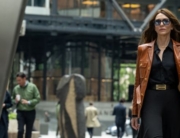The opening shot of a dead child about to be buried as his parents mourn graveside sets the tone for this efficient and at times absorbing retelling of Shakespeare’s violent tragedy. The few and infrequent bits of the play’s comic relief have been excised for one uniform, despairing depiction of warrior Macbeth’s murderous ascent to the Scottish throne.
The blood red sky hints at the end of days, and the medieval setting and the war paint recall Braveheart, with the requisite blood squirting and mud flying, courtesy of the battles scenes, edited slo-mo Matrix-style—the cloud-covered Scottish highlands have never looked so desolate. So in a sense, this Macbeth is up-to-date, though set in its own candlelit world but in sync with the rueful sentiment of current dystopian dramas: the sundrenched mayhem of Mad Max: Fury Road and the authoritarian criminality of The Hunger Games. Director Justin Kurzel’s film should appeal to a similar young adult–based audience, and it doubles as well as a sturdy gateway into Shakespeare. It makes lucid the themes and characters with a wide-ranging color palette and strong, internalized performances. And it sure beats CliffsNotes.
The opening scene definitively answers a question that the play quietly asks: whether Macbeth and his wife, usually referred to as Lady Macbeth (though she doesn’t have a title), had a child. The film also establishes the couple’s sexual connection with ease, which is crucial for the plot’s credibility, since it initially moves at a fast speed after a sparse setup. After winning a battle on behalf of King Duncan, Macbeth encounters three witches who prophesize that he will become Thane of Cawdor. Upon learning this revelation, Macbeth’s wife latches upon a plan: Why stop there? Why not become king?
Taking on one of Shakespeare’s shortest and fastest moving plays, the adaptors have sliced off roughly three-quarters of the text and rearranged the dialogue here and there, with many of the most famous speeches trimmed. In many productions of Verdi’s opera Macbeth, which features a libretto that’s remarkably faithful to the Bard, considering even more of the text was chopped off to make room for the score, the witches are less supernatural and more ordinary. Likewise, here they’re portrayed as farming women living a hard-scrabble life. So don’t expect Hecat to drop by or to hear the incantation “double double, toil and trouble.” (In the Metropolitan Opera’s current production, the witches are bag ladies by way of photographer Diane Arbus.)
However, as a result of the cuts, the murder of Duncan unfolds tentatively and without the uncertainty or suspense of the play. Much of Shakespeare’s dialogue in this sequence is made up of short bursts of words, one exchange coming on top of another, if not overlapping. Strangely, the film’s murder plays out without urgency, and so there is less screen time for Lady Macbeth. The overall treatment is less reverent and plodding than Roman Polanski’s earthy and longer version from 1971. Kurzel’s film has an advantage over the stage version, though: the audience witnesses up close how brutal and difficult it is for Macbeth to slice the throat of his mentor, Duncan.
It was also a good decision not to include Macbeth’s description of himself, that the idea of regicide “shakes so [his] single state,” because star Michael Fassbender gives a coolly cerebral, though convincing performance. It’s refreshing to see a Macbeth step away from the hotheaded hysterical and move toward the myopic and calculating, with a level of intensity that the camera embraces but that would get lost on a large stage.
Of all the actors in the cast, French actress Marion Cotillard offers the most detailed and precise interpretation. (At the film’s premiere at Cannes, the giant Palais Lumière garbled up the deep male voices; hers was crystal clear.) She brings a refreshing delicacy to all the battle bloodshed and male blustering without losing her character’s steeliness, and the audience can pinpoint exactly when Lady Macbeth questions and then becomes repelled by her husband’s behavior. In a daring and successful departure of Lady Macbeth’s mad scene, Cotillard’s coconspirator in murder has enough of her wits about her to recall and regret her actions. She talks to herself not because she sees imaginary people and objects but in an attempt to console herself. (Because of the pruning, the only other significant female role, Lady Macduff, is drastically reduced.)
However, Kurzel tends to linger on reactions, and the actors don’t always pick up the pace. Some pauses are long enough for an invading army to storm through. Even the apparitions that the witches conjure take their time proclaiming the future. For a few scenes, Fassbender and Cotillard have free rein, letting the words take over and producing a steamrolling momentum. Whether or not viewers understand what the two are saying word for word, their conspiratorial intentions stand out against the murky backdrop. If only there were more scenes where the actors were directed to trust the text’s inherent rhythm.







Leave A Comment